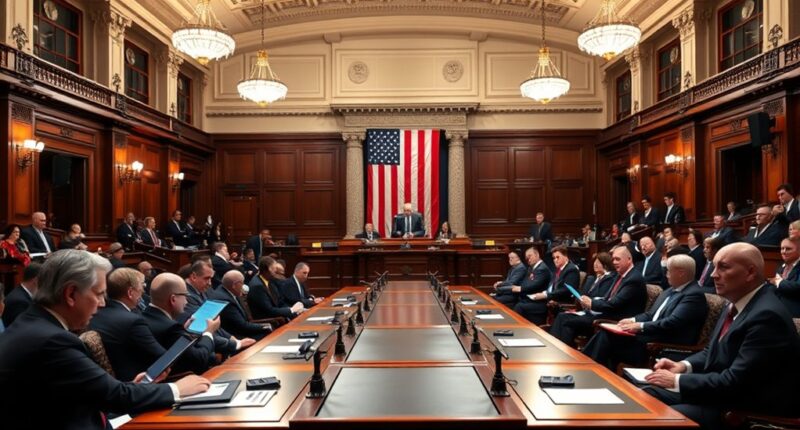The Senate’s passage of the Crypto Clarity Act sets a clearer regulatory path for digital assets in the U.S., mainly assigning oversight to the CFTC and defining rules for exchanges, brokers, and dealers. This move aims to reduce uncertainty, boost transparency, and promote market stability. It’s a major step that could open doors for industry growth and investor confidence. If you want to understand how these new rules might impact you, there’s more to explore ahead.
Key Takeaways
- The Senate has approved the Crypto Clarity Act, providing a clear regulatory framework for digital assets in the U.S.
- The legislation designates the CFTC as the primary regulator for cryptocurrencies and digital commodities.
- It establishes compliance standards for exchanges, brokers, and dealers to enhance market transparency and investor protection.
- The Act aims to reduce legal uncertainties, foster industry growth, and promote innovation within a regulated environment.
- Ongoing bipartisan negotiations are crucial for final legislative approval and implementation of the new regulations.
Overview of the Crypto Clarity Act Legislation
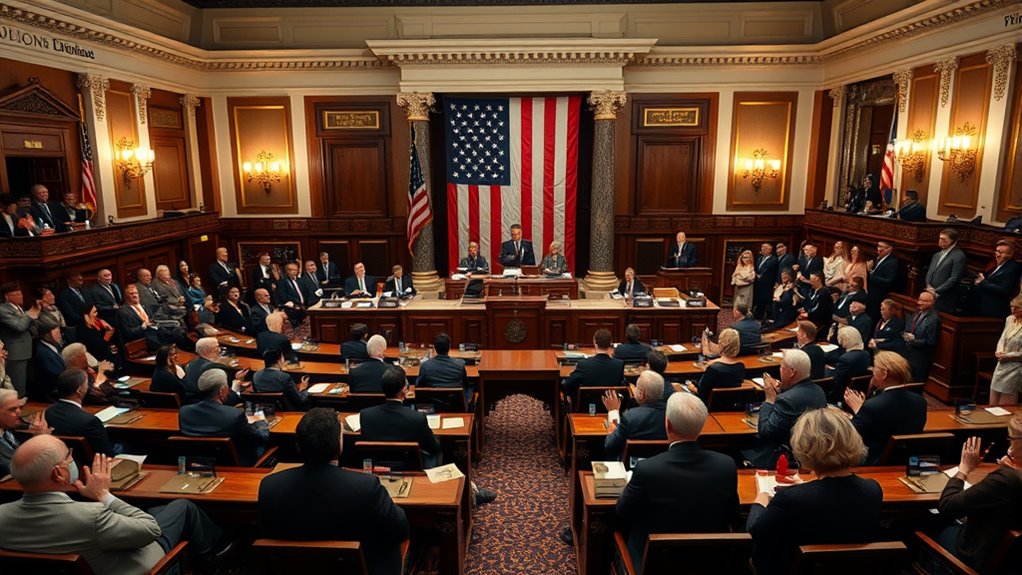
The Crypto Clarity Act, formally known as the Digital Asset Market Clarity Act of 2025, aims to create a clear regulatory framework for digital commodities, which are assets relying on blockchain technology for their value. This legislation clarifies how digital assets are classified and regulated in the U.S., primarily assigning oversight to the Commodity Futures Trading Commission (CFTC). It focuses on regulating transactions involving digital commodities, exchanges, brokers, and dealers, while also defining certain exemptions for mature blockchain assets. The bill seeks to promote transparency and stability in the market, making it easier for companies to operate within a predictable legal environment. Although still in progress, this legislation marks a significant step toward establishing exhaustive rules for the evolving digital asset landscape. Understanding regulatory clarity is essential for stakeholders navigating this complex environment.
Key Provisions and Regulatory Framework

Key provisions of the Crypto Clarity Act establish a clear regulatory framework by designating the Commodity Futures Trading Commission (CFTC) as the primary regulator for digital commodities, including cryptocurrencies relying on blockchain technology. You’ll see specific rules aimed at defining digital asset classifications and clarifying jurisdiction. The act also sets standards for market participants, such as exchanges, brokers, and dealers, to ensure compliance. Additionally, establishing regulatory clarity helps foster innovation and investor confidence in the digital asset space.
- CFTC oversight of digital commodities trading and derivatives
- SEC regulation of securities-related crypto activities
- Exemptions for digital commodities on mature blockchains
- Requirements for anti-money laundering and customer verification
- Standards for trade monitoring and recordkeeping to promote transparency
This framework aims to balance innovation with investor protection, providing clarity for industry players.
Impact on Digital Asset Market Participants
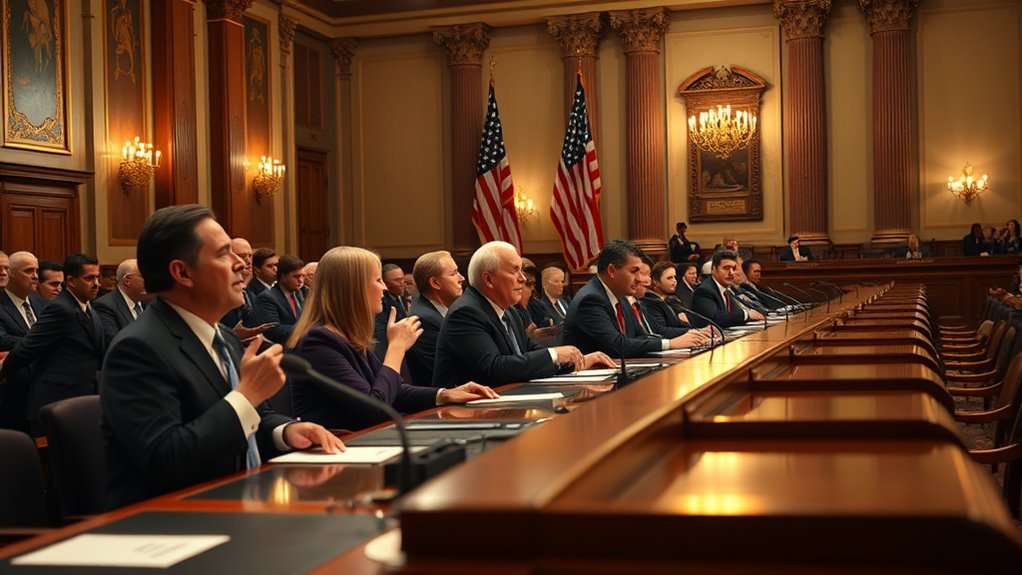
With the new clarity from the Crypto Clarity Act, you’ll find it easier to navigate compliance requirements and reduce legal uncertainties. This shift can help you operate more confidently, knowing how regulations apply to your digital assets. Ultimately, clearer rules may lead to increased market stability, benefiting your long-term growth and security. Understanding regulatory frameworks can also help you make informed decisions in a rapidly evolving landscape.
Regulatory Clarity Benefits
Regulatory clarity can considerably benefit digital asset market participants by providing a clear framework within which they can operate confidently. This transparency reduces uncertainty, helping you plan and execute transactions more efficiently. With defined rules, you can better understand compliance obligations, minimizing legal risks. It also fosters trust among investors and partners, boosting market stability. Additionally, clear regulations can attract institutional investors seeking a predictable environment. You’ll find it easier to innovate within a structured legal landscape, encouraging growth and new product development. Furthermore, regulatory clarity can prevent arbitrary enforcement actions, ensuring fair treatment. Overall, this clarity strengthens market integrity, increases transparency, and makes the digital asset space more accessible for everyone involved. Incorporating mindfulness techniques can also support stress reduction during times of regulatory change, helping you maintain focus and clarity amidst evolving policies.
Compliance Requirements Shift
As clarity around regulations improves, digital asset market participants will face new compliance requirements that reshape how they operate. You’ll need to adopt stricter anti-money laundering measures, such as verifying customer identities and reporting suspicious activities, in line with the Bank Secrecy Act. Recordkeeping will become more rigorous, requiring detailed logs of transactions and customer data. You may also need to adjust how you handle customer assets, avoiding commingling to meet new standards. If you run a digital commodity exchange or broker, you’ll be subject to oversight by the CFTC, with specific registration and monitoring obligations. These changes aim to increase transparency and reduce illicit activity but will require you to update internal systems and processes to stay compliant. Implementing comprehensive well-being tips can also help staff adapt to regulatory changes more effectively.
Market Stability Enhancement
The passage of the Crypto Clarity Act promises to bring greater stability to the digital asset market by providing clear regulatory guidelines, which can reduce volatility and build investor confidence. As a market participant, you’ll benefit from reduced uncertainty around compliance and legal risks. This clarity encourages responsible trading and investment, helping to prevent sudden market shocks. It also promotes a more predictable environment for innovation and growth.
- Clearer rules reduce unexpected regulatory actions
- Improved transparency enhances investor trust
- Stable regulations minimize sudden market swings
- Greater confidence attracts institutional investors
- Consistent oversight creates a safer trading space
Stakeholder Reactions and Industry Perspectives
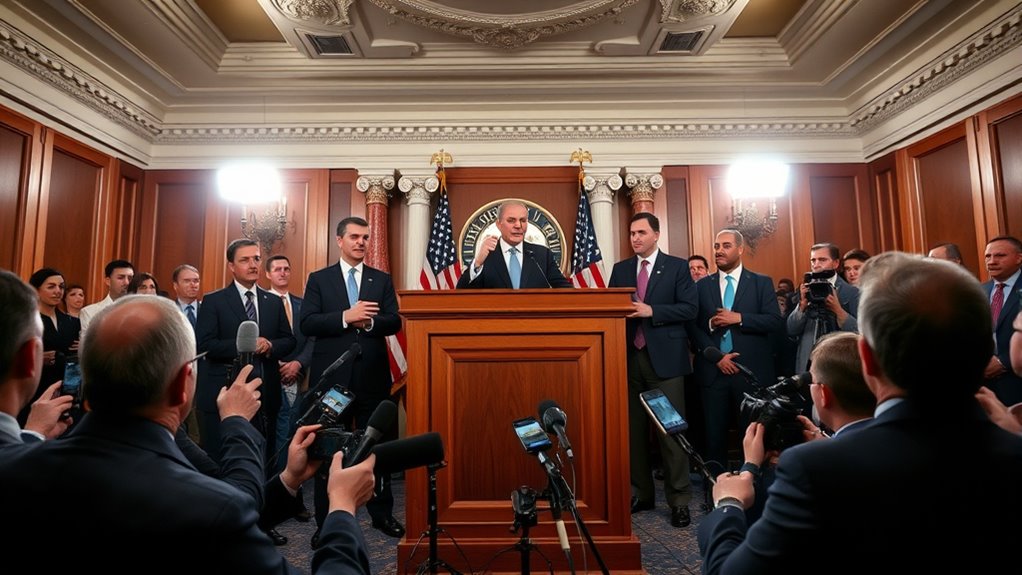
Crypto industry leaders have expressed cautious optimism about the Senate passing the Crypto Clarity Act, recognizing that clearer regulations could foster growth and innovation. They see it as a step toward reducing uncertainty that has hampered industry development. Many welcome the delineation of regulatory responsibilities between the CFTC and SEC, which could streamline compliance efforts. Industry insiders emphasize that clarity on digital asset classifications and transaction rules can help attract institutional investors and expand market participation. Additionally, understanding the divorce process in various states can provide insights into how legal frameworks adapt to societal changes. However, some remain wary of potential loopholes and overregulation, fearing it might stifle innovation. Overall, stakeholders agree that the legislation’s passage signals a positive shift, encouraging more dialogue with policymakers. They remain hopeful that ongoing negotiations will address remaining concerns and lead to a balanced regulatory framework.
Challenges and Opportunities Ahead
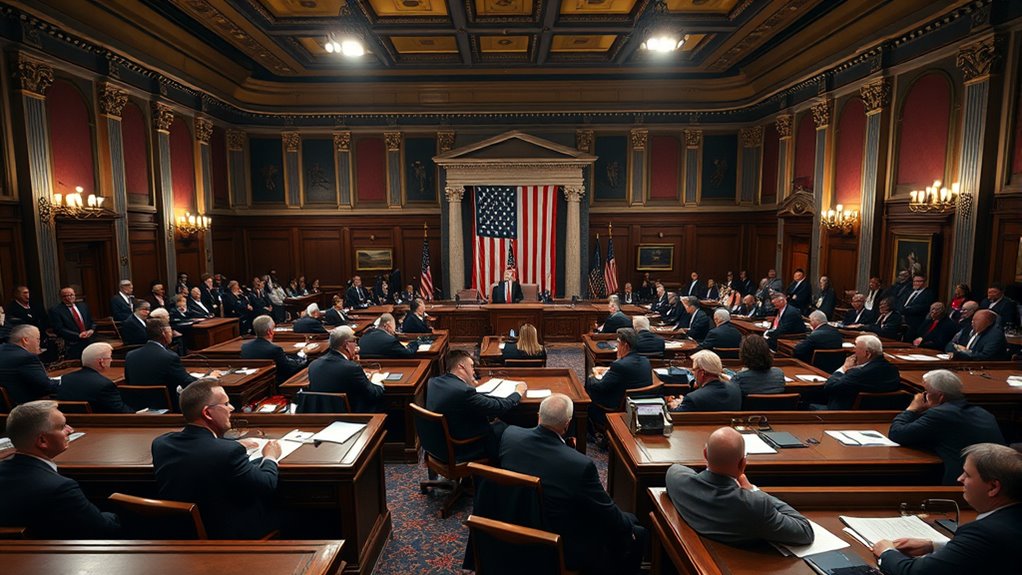
While the passage of the Crypto Clarity Act signals progress, regulatory hurdles still pose challenges for the industry’s growth. You’ll need to watch how lawmakers address remaining disagreements and implement new rules. Ultimately, these developments could either accelerate opportunity or create obstacles for digital asset innovation. Staying informed about cryptocurrency regulation will be crucial as the landscape continues to evolve.
Regulatory Hurdles Remain
Despite progress in drafting legislation like the Digital Asset Market Clarity Act, significant regulatory hurdles still stand in the way of all-encompassing crypto reform. You face ongoing challenges from policy disagreements that delay bipartisan support. The Senate remains divided over issues like DeFi regulation and stablecoin oversight. You must navigate complex negotiations between Democrats and Republicans, often paused or stalled. Industry stakeholders continue to push for clearer rules but encounter resistance from lawmakers wary of overreach. Key hurdles include:
- Policy disagreements delaying consensus
- Resistance to comprehensive DeFi regulation
- Uncertainty around stablecoin oversight
- Fragmented approaches between agencies
- Limited bipartisan support hindering progress
- Regulatory clarity remains elusive, complicating industry adaptation and strategic planning.
These obstacles threaten to slow reform, requiring persistent effort to open the full potential of crypto legislation.
Industry Growth Prospects
The digital asset industry faces a pivotal moment, with recent legislative developments opening new opportunities for growth. As clarity emerges around regulations, your prospects for innovation and expansion improve. Companies can now plan with greater certainty, attracting more institutional investors and mainstream adoption. However, challenges remain—policy disagreements and evolving rules could slow progress or create compliance hurdles. Navigating these changes requires agility and strategic foresight. The legislation’s focus on transparency and oversight may boost investor confidence, fostering a more mature market. Your ability to adapt to these new frameworks will determine your growth trajectory. The table below highlights key opportunities and challenges ahead: regulatory framework
Next Steps in the Legislative Process
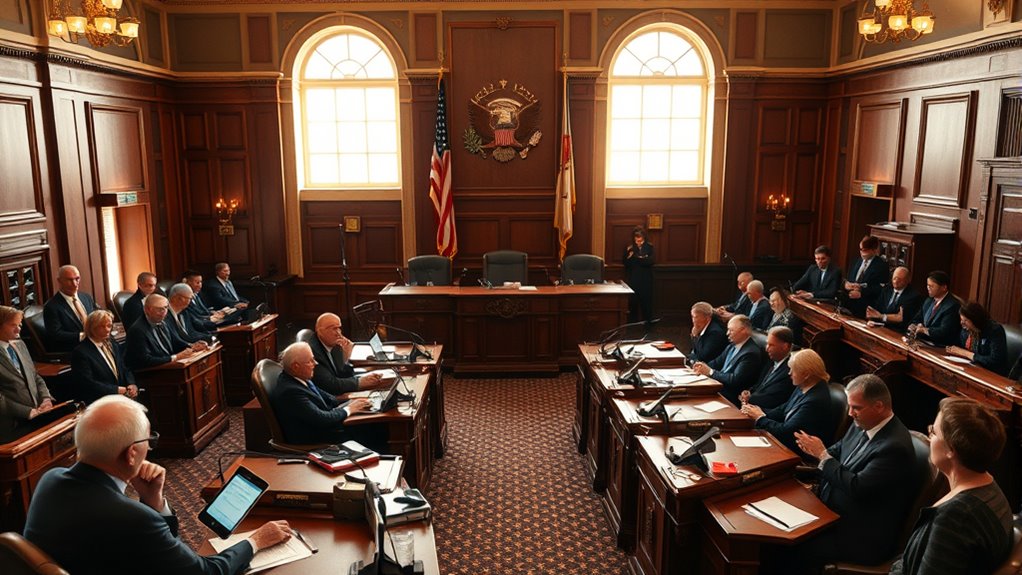
The next steps in the legislative process depend on efforts to bridge partisan divides and secure bipartisan support for crypto regulation. You’ll need to watch how negotiations unfold between Democrats and Republicans, especially on key issues like market structure and DeFi regulation. To move forward, lawmakers must:
- Build consensus on the bill’s scope and regulatory oversight
- Address concerns about investor protections and loopholes
- Incorporate feedback from industry stakeholders and regulators
- Reconcile policy differences between parties
- Secure enough votes in both chambers for final passage
Bipartisan collaboration is essential; without it, progress stalls. You should stay informed on committee hearings and negotiations, as these will determine whether the legislation advances toward presidential approval. The legislative timeline remains uncertain until a consensus emerges.
Frequently Asked Questions
How Will the Bill Affect Existing Crypto Regulations in Different States?
The bill will likely create a more uniform regulatory environment across states by clarifying federal rules for digital commodities and crypto activities. You may see states aligning their laws to match the federal framework, reducing confusion. However, some states might maintain stricter or different rules, affecting how you can operate or invest locally. Overall, it should streamline compliance but won’t eliminate regional variations entirely.
What Specific Criteria Determine if a Blockchain Is Considered “Mature” for Exemptions?
Imagine your blockchain as a fine wine—only mature if it’s been around long enough, proven stable, and widely adopted. The criteria include a track record of consistent operation, a robust user base, and proven security measures. If your blockchain passes these tests, it might qualify for exemptions. In short, maturity hinges on age, stability, and community trust—basically, the blockchain’s reputation as a seasoned, reliable citizen in the digital world.
Will the Legislation Impact International Digital Asset Trading and Cross-Border Compliance?
Yes, the legislation will impact international digital asset trading and cross-border compliance. You’ll need to guarantee your operations follow U.S. regulations when dealing with digital commodities and derivatives, even if you’re outside the country. The bill emphasizes transparency, anti-money laundering measures, and proper recordkeeping, which means your international transactions might face stricter scrutiny and require adjustments to meet U.S. standards, potentially affecting global trading practices.
How Does the Bill Address Consumer Protections Beyond Anti-Money Laundering Measures?
You’ll find that the bill emphasizes consumer protections through requirements for trade monitoring, recordkeeping, and customer asset safeguards. It mandates transparent transaction reporting and aims to prevent fraud and manipulation. While primarily focused on regulatory clarity, it also encourages market integrity by setting standards for digital asset exchanges and brokers. These measures help protect users by ensuring fair trading practices and reducing risks associated with digital asset transactions.
What Are the Potential Penalties for Non-Compliance Under the New Regulatory Framework?
Are you aware of the consequences if you don’t follow the new rules? The legislation could impose hefty fines, license suspensions, or even criminal charges for non-compliance. Regulatory authorities like the CFTC and SEC will enforce penalties for violations such as fraudulent trading, money laundering, or failing to meet recordkeeping standards. Staying compliant is vital to avoid these serious repercussions and guarantee your activities remain within legal boundaries.
Conclusion
As you watch this legislation unfold, consider how the Crypto Clarity Act might actually reflect a subconscious desire for regulatory stability—perhaps an attempt to legitimize digital assets as a future financial cornerstone. While some see it as a necessary step, others question if it truly addresses industry complexities. Ultimately, whether it’s a calculated move or an instinctive push toward mainstream acceptance, the law’s outcome will shape the crypto landscape for years to come.
